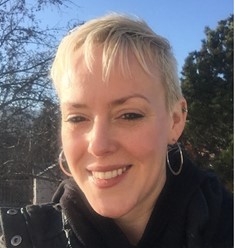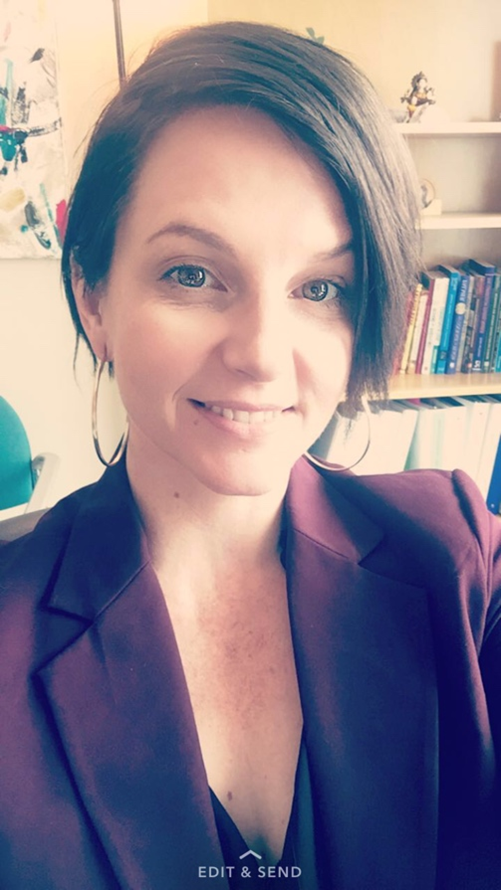CEWIL Webinar:
Advancing Justice, Equity, Diversity, and Inclusion in Work-Integrated Learning: Tools for Employers and Community Partners
Facilitator Bios
 Simran Ahmed (she/her) resides on the unceded homelands of the hən̓q̓əmin̓əm̓ and Sḵwx̱wú7mesh speaking peoples. She is the Equity, Diversity and Inclusion (EDI) Educator within Work Integrated Learning at Simon Fraser University where she instructs two online courses: Job Search Success (JSS), designed to help students with their work search documents; and Effective Intercultural Communication (EIC), designed to help students grapple with concepts such as power, privilege, belonging, reconciliation and intercultural dynamics. Simran facilitated 2 cohorts of EIC for this specific project, contributed to data analysis, and the creation of this toolkit. She also creates and curates educational resources related to JEDI topics and provides administrative support to the WIL EDI team. After moving to Canada as an international student in 2015, Simran obtained her BA degree in Criminology with certificates in Legal Studies and Corrections. She is now pursuing her MA within SFU Criminology with a focus on risk assessments. She enjoys having conversations about cultural differences/similarities, social values and norms, and everything social justice related. When not stuck caffeinated in front of her laptop, Simran recharges by being in the great outdoors!
Simran Ahmed (she/her) resides on the unceded homelands of the hən̓q̓əmin̓əm̓ and Sḵwx̱wú7mesh speaking peoples. She is the Equity, Diversity and Inclusion (EDI) Educator within Work Integrated Learning at Simon Fraser University where she instructs two online courses: Job Search Success (JSS), designed to help students with their work search documents; and Effective Intercultural Communication (EIC), designed to help students grapple with concepts such as power, privilege, belonging, reconciliation and intercultural dynamics. Simran facilitated 2 cohorts of EIC for this specific project, contributed to data analysis, and the creation of this toolkit. She also creates and curates educational resources related to JEDI topics and provides administrative support to the WIL EDI team. After moving to Canada as an international student in 2015, Simran obtained her BA degree in Criminology with certificates in Legal Studies and Corrections. She is now pursuing her MA within SFU Criminology with a focus on risk assessments. She enjoys having conversations about cultural differences/similarities, social values and norms, and everything social justice related. When not stuck caffeinated in front of her laptop, Simran recharges by being in the great outdoors!
 Amie McLean, Ph.D. (she/her) lives on the unceded territories of the Tk’emlúps te Secwépemc within Secwépemc'ulucw. She is a sociologist and anti-racist feminist writer and educator whose work focuses on social justice issues in Canadian post-secondary education and work. Her SSHRC-funded dissertation examined how racialized, classed, and gender norms interact with occupational cultures to (re)produce industrial hierarchies of inequality, exploitation, and blame. Amie’s previous publications address gendered, racialized, and classed power dynamics at work; the connections between regulatory frameworks and industrial exploitation and inequities, and Indigenous post-secondary education funding. She was co-Chair of the Learning at Intercultural Intersections international conference, and co-edited a special issue that came out of that event. She is the Manager for Equity, Diversity, and Inclusion Curriculum for Work Integrated Learning at Simon Fraser University. In that role, she applies intersectional, decolonizing, and anti-oppressive approaches to embed EDI content, frameworks, and practices in faculty, staff, student, and employer-facing curricula.
Amie McLean, Ph.D. (she/her) lives on the unceded territories of the Tk’emlúps te Secwépemc within Secwépemc'ulucw. She is a sociologist and anti-racist feminist writer and educator whose work focuses on social justice issues in Canadian post-secondary education and work. Her SSHRC-funded dissertation examined how racialized, classed, and gender norms interact with occupational cultures to (re)produce industrial hierarchies of inequality, exploitation, and blame. Amie’s previous publications address gendered, racialized, and classed power dynamics at work; the connections between regulatory frameworks and industrial exploitation and inequities, and Indigenous post-secondary education funding. She was co-Chair of the Learning at Intercultural Intersections international conference, and co-edited a special issue that came out of that event. She is the Manager for Equity, Diversity, and Inclusion Curriculum for Work Integrated Learning at Simon Fraser University. In that role, she applies intersectional, decolonizing, and anti-oppressive approaches to embed EDI content, frameworks, and practices in faculty, staff, student, and employer-facing curricula.
 Akanksha Thakur, M.Ed. (she/her) immigrated from Mumbai, India and resides on unceded Indigenous territories in BC. In her work as the Program Coordinator: Equity, Diversity, and Inclusion Resources in Work Integrated Learning (WIL) at Simon Fraser University (SFU) she curates and collaborates on building EDI resources designed to help make WIL’s experiential learning opportunities more inclusive and accessible to diverse students. Akanksha has an MEd. in Equity Studies in Education and it is her education, combined with her lived experiences as an immigrant and settler, that fuel her passion for issues surrounding anti-racism, equity, accessibility and inclusion in an education context. Akanksha has been a recipient of the John Gibbard Memorial Award from the United Nations Association of Canada that recognized her contributions for fostering positive change within the local community. She was also invited by the Canadian Federal Government to offer her insights on Canada's first-ever national Anti-Racism Policy. Currently, Akanksha also works with the Canadian Race Relations Foundation to offer workshops on anti-racism and intercultural communication to practitioners and businesses across Canada.
Akanksha Thakur, M.Ed. (she/her) immigrated from Mumbai, India and resides on unceded Indigenous territories in BC. In her work as the Program Coordinator: Equity, Diversity, and Inclusion Resources in Work Integrated Learning (WIL) at Simon Fraser University (SFU) she curates and collaborates on building EDI resources designed to help make WIL’s experiential learning opportunities more inclusive and accessible to diverse students. Akanksha has an MEd. in Equity Studies in Education and it is her education, combined with her lived experiences as an immigrant and settler, that fuel her passion for issues surrounding anti-racism, equity, accessibility and inclusion in an education context. Akanksha has been a recipient of the John Gibbard Memorial Award from the United Nations Association of Canada that recognized her contributions for fostering positive change within the local community. She was also invited by the Canadian Federal Government to offer her insights on Canada's first-ever national Anti-Racism Policy. Currently, Akanksha also works with the Canadian Race Relations Foundation to offer workshops on anti-racism and intercultural communication to practitioners and businesses across Canada.
 Heather Williams, M.Ed (she/her) is a fifth generation settler to Canada whose ancestors were English, Irish and Jewish. Heather is grateful to now live on unceded Coast Salish territories of the Kwantlen and Qayqayt Nations. As a queer identified, anti-racist feminist Heather applies an intersectional and trauma-informed approach to her work. As a life-long learner Heather approaches equity, diversity, decolonization and inclusion with a carefully cultivated sense of cultural humility. Heather has published articles and reports on intercultural learning, and equity and inclusion curriculum design. Heather earned her Masters of Education in Equity Studies and is currently pursuing her PhD in Philosophy of Education. Heather’s greatest teachers are her children who inspire her to make the world a better place.
Heather Williams, M.Ed (she/her) is a fifth generation settler to Canada whose ancestors were English, Irish and Jewish. Heather is grateful to now live on unceded Coast Salish territories of the Kwantlen and Qayqayt Nations. As a queer identified, anti-racist feminist Heather applies an intersectional and trauma-informed approach to her work. As a life-long learner Heather approaches equity, diversity, decolonization and inclusion with a carefully cultivated sense of cultural humility. Heather has published articles and reports on intercultural learning, and equity and inclusion curriculum design. Heather earned her Masters of Education in Equity Studies and is currently pursuing her PhD in Philosophy of Education. Heather’s greatest teachers are her children who inspire her to make the world a better place.